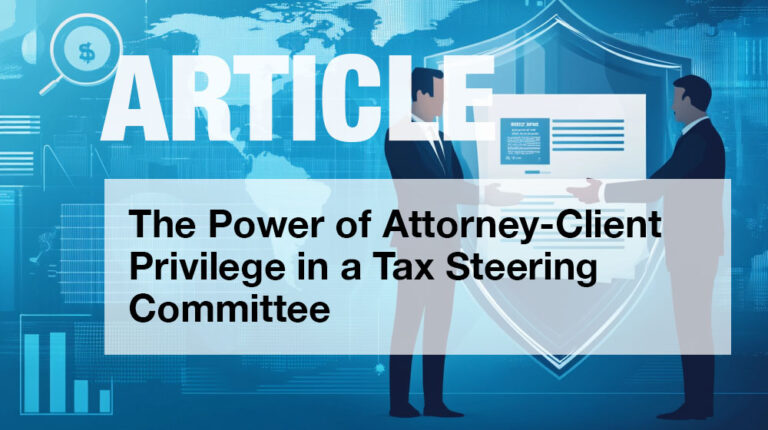Expert Workshop: Safeguarding Tax Strategies – The Power of Attorney-Client Privilege in a Tax Steering Committee
Table of Contents
CLICK HERE TO REGISTER FREE
Why Legal Privilege is a Game-Changer in Tax Governance
In today’s landscape of increasing tax scrutiny and regulatory oversight, multinational enterprises must ensure that their tax strategies remain both compliant and protected. A well-structured Tax Steering Committee (TSC) plays a crucial role in managing tax risks, but without legal oversight, sensitive discussions and documentation could be exposed during audits, investigations, or litigation.
By integrating legal counsel into the TSC, companies can invoke attorney-client privilege, creating a “privilege dome” that shields tax planning strategies from compelled disclosure. This legal safeguard is essential in mitigating risk, ensuring confidentiality, and protecting corporate tax positions against aggressive tax enforcement actions.
Key Benefits of a Legally Structured Tax Steering Committee
🔹 Confidentiality & Protection – Ensures sensitive tax strategies remain undisclosed in audits or disputes.
🔹 Stronger Compliance Framework – Aligns tax policies with legal and regulatory requirements.
🔹 Strategic Tax Risk Management – Shields internal tax deliberations from unintended exposure.
🔹 Enhanced Corporate Tax Integrity – Supports ethical tax governance and robust compliance.
As global tax authorities tighten regulations and expand enforcement measures, the role of legal privilege in tax planning is more critical than ever. This workshop will equip professionals with practical strategies to fortify their organization’s tax governance and safeguard sensitive tax discussions.
Why You Should Attend This Workshop
With international tax enforcement on the rise, tax professionals must proactively structure their tax governance frameworks to protect their organization’s interests. Attending this expert-led workshop will help you:
✅ Understand the Role of a Tax Steering Committee – Learn how to build an effective TSC that strengthens compliance.
✅ Leverage Attorney-Client Privilege – Discover how legal counsel can create a protective legal shield around sensitive tax matters.
✅ Align Tax Strategy with Legal Regulations – Ensure that your tax planning efforts meet global compliance standards.
This session, led by industry experts Dr. Daniel Erasmus and Mr. Renier van Rensburg, bridges the gap between practical tax governance and academic expertise—making it an unmissable event for tax professionals, in-house counsel, and corporate leaders handling international tax and transfer pricing complexities.
CLICK HERE TO REGISTER FREE
Workshop Details
📅 Date: Wednesday, 12 February
🕒 Time: 15:00 GMT
📍 Format: Live Online Session
🎤 Hosts: Prof. Dr. Daniel Erasmus & Mr. Renier van Rensburg
🏛 Affiliations: Middlesex University & InformaConnect Academy
Key Topics Covered:
✔ Building an Effective Tax Steering Committee – A critical component of international tax risk management.
✔ Leveraging Attorney-Client Privilege – How legal counsel enhances tax compliance and protects tax planning.
✔ Aligning Tax Strategy with Legal Frameworks – Ensuring resilience against audits and disputes.
This 45-minute session provides practical, actionable insights designed to fortify your organization’s tax strategy while maintaining a robust legal shield.
🔹 Bonus: This webinar also complements the Postgraduate Programmes in International Taxation and Transfer Pricing, seamlessly bridging academic theory with real-world tax governance applications.
📌 Reserve Your Spot Today! Secure your place to gain expert insights and protect your organization from evolving tax risks.


